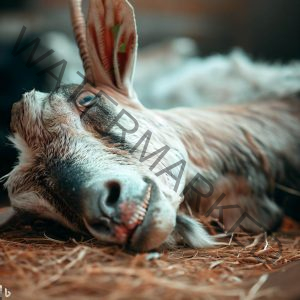Raising goats can be a rewarding and fulfilling endeavor for beginner farmers, but like any livestock, goats can face health challenges. Recognizing when a goat is in distress or nearing the end of its life is crucial for ensuring the well-being of your animals and taking appropriate action when needed. In this comprehensive guide, we will outline the key signs to look for when a goat is dying, equipping you with the knowledge to provide the best care for your goats.
How to Identify Dying Goat In Your Farm: A Comprehensive Guide for Beginner Farmers

1. Observing Behavior and Activity
Goats are known for their curious and active nature. When a goat is feeling unwell or nearing the end of its life, you may notice a significant change in its behavior and activity level. Here are some behavioral signs to watch out for:
Read Also: [Beginner’s Guide] 10 Best Herbal Goat Dewormers
Lethargy:
A noticeable lack of energy and enthusiasm can be an early indicator that a goat is not feeling well. A dying goat may spend more time lying down and less time interacting with its surroundings.
Separation:
Goats are social animals, and they often stick together in a group. If you observe a goat becoming isolated from the herd, it could be a sign that it’s not feeling well. Goats nearing the end of their life may seek out quiet and secluded spots.
Read Also: 10 Home Remedies for Sick Goats [Beginner’s Guide]
Reduced Appetite:
A sudden decrease in appetite or a complete refusal to eat is a significant red flag. Goats that are not eating are often in distress and could be suffering from a serious health issue.
2. Physical Indicators
In addition to changes in behavior, physical indicators can provide valuable insights into a goat’s health condition:
Body Temperature:
A goat’s normal body temperature is around 101.5 to 103.5 degrees Fahrenheit (38.6 to 39.7 degrees Celsius). If you notice a significant drop or rise in temperature, it could signal a health problem.
Read Also: 10 Herbs for Diarrhea Treatment in Goats [Beginner’s Guide]
Labored Breathing:
Rapid, shallow, or labored breathing can be a sign of respiratory distress. Observe your goat’s breathing patterns and listen for any wheezing or coughing sounds.
Dehydration:
A goat that is dying may become dehydrated. Check for sunken eyes, dry and tacky gums, and skin that doesn’t quickly return to its normal position when pinched.
Read Also: 10 Natural Pain Relief Remedies for Goats [Herbs & DIY Meds]
Weakness and Incoordination:
Goats that are nearing the end of their life may become weak and unsteady on their feet. They might stumble or have difficulty standing up.
Eyes and Mucus Membranes:
Examine the eyes and mucus membranes (gums and inside of the eyelids). Pale or jaundiced mucus membranes could indicate serious health issues.
Read Also: Coccidiosis in Goats [Causes, Symptoms, and Treatment]
Seeking Professional Help
If you suspect that a goat on your farm is dying or seriously ill, it’s important to seek help from a veterinarian experienced in treating goats. A veterinarian can accurately diagnose the issue and provide guidance on the best course of action, which may involve medical treatment or euthanasia if the goat’s suffering is severe and incurable.
Prevention and Care
Preventing health issues and addressing them promptly can significantly improve the well-being of your goats. Here are some preventive measures and care tips:
Regular Health Checks:
Perform routine health checks on your goats. This involves observing their behavior, physical condition, and appetite on a daily basis.
Read Also: Miscarriage In Goats & Sheep [Signs, Causes, and How to Prevent]
Nutrition:
Provide a balanced and nutritious diet to ensure your goats are getting the essential nutrients they need. Consult a veterinarian to develop a suitable feeding plan.
Clean Environment:
Keep the living area clean and well-maintained to prevent the spread of diseases. Proper sanitation can go a long way in promoting goat health.
Read Also: 25 Common Diseases Of Goats And How To Treat Them
Vaccinations and Parasite Control:
Follow a vaccination schedule and implement effective parasite control measures recommended by your veterinarian.
Isolation:
If a goat shows signs of illness, isolate it from the rest of the herd to prevent the potential spread of disease.
Conclusion
As a beginner farmer raising goats, being attuned to the signs of a dying goat is a crucial skill. By observing changes in behavior, physical indicators, and seeking professional help when needed, you can provide the best possible care for your goats. Remember, preventive measures and attentive care can greatly contribute to the overall health and longevity of your goat herd.




One Reply to “[Beginner’s Guide] How to Identify Dying Goat In Your Farm”